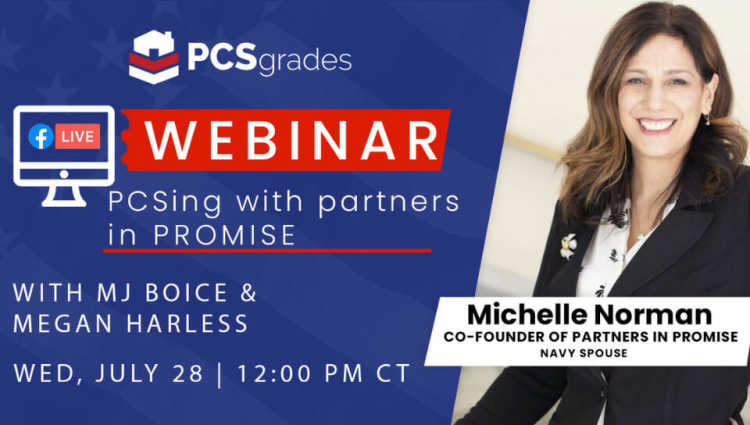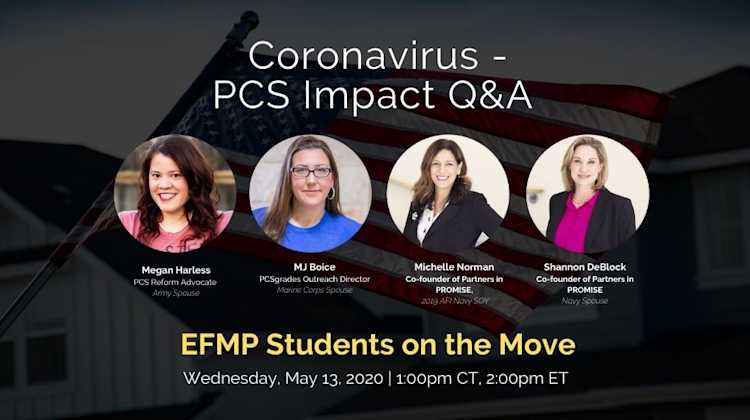Webinar: PCSing with partners in promise
by Lizann Lightfoot - August 23rd, 2021

Our Guest: Michelle Norman, Executive Director of Partners in Promise. I’ve been a Navy spouse for over 25 years. I have two wonderful children. One is my daughter who was the inspiration behind our organization. She has over 21 medical diagnoses. So when we finally got through some of the medical issues, we ran into education challenges as we moved. We are here to be a voice for EFMP families, particularly when it comes to special education. We elevate their voices, provide resources, and advise our national leaders who are in a position to make change. We know there are many pain points when you move, so we are here to support our military families.
When school restarted last year, some went back in person and others stayed virtual. How is the mix of options affecting who are PCSing?
It’s so different from state-to-state. The past year has been incredibly difficult for all military families. Going from an all-virtual classroom to a physical classroom is a difficult adjustment, especially mid-school-year. All those challenges are amplified for special education students. These kids thrive on familiarity and routine. Special education children have the right to access education, and accessing a Chromebook does not mean they have access to their education. Many students suffer from hearing, eyesight, or have only recently attained a skill, so with lack of therapy they regress and lose skills. Some students did well with virtual learning, and it’s mostly families whose children have social anxiety. The virtual aspect was good for them. But other children had regression and lost instruction, especially if they went through a PCS.
The survey we conducted last year showed that over 90% of EFMP families do eventually experience a move. And each time, there is a period of adjustment and lost instruction.
Some schools are doing recovery service plans, so if they have lost services for a while due to virtual learning, there was an attempt to recover those services. But when you move to a new school district, there is no obligation for them to offer those recovery services, because if those schools were open the whole time, then they don’t have to offer recovery service programs.
When you learn that you are PCSing, you need to send as much information as possible to the next duty station. Not just the grades, but classroom observations and teacher’s notebook, so you can get summative data on your child before you move. Get the IEP (Individualized Education Program) into the hands of the next school district as soon as possible. We are pushing for advanced enrollment so that schools can prepare ahead of time for IEP accommodations. Some states won’t enroll until you have the proof of residency. But it benefits everyone to know if special transportation is required. Reach out to the school districts, be proactive, and tell them about your child.
For a while, we were asking parents to keep all their IEP evaluations at home, but now this is all probably out of date. There’s no reason to wait! COVID has probably impacted every child, so it’s time to re-evaluate and see if changes need to be made now. Get updated evaluations so you don’t waste time. Get those meetings in order and get evaluations done as quickly as possible.
What can the parent do if it feels like their child has been left behind?
The first thing is to call an IEP meeting. If they have an IEP, then they need to get the team together. Document all the concerns–is it problems with homework, district testing, quarterly evaluations, etc? We are a data-driven organization. We want to be measuring progress and determining whether goals are being met. Data, data, data is so important. Bring those to the table. That’s when those evaluations are so important, data from the neuro/psych eval can tell you so much. Document everything. If a teacher has a casual conversation or phone call with a parent, send an email reiterating the message and asking for a follow-up appointment.
Remember not everyone has a chance to see the IEP, so we prepared a one-pager for our younger student that talked about important elements of the IEP that they can see briefly–likes, dislikes, what helps them, where they need assistance, etc. It’s important to highlight any special education law, military concession, and let families know that they have a voice! Data drives change, and we are a data-driven organization. We encourage families to go back to their own base and contact the EFMP office for their branch. Go to a meeting, and that is a big deal when you are a parent who just moved to a new location!
EFMP standardization is a big topic that has been talked about for years, and it was finalized last year in the NDAA. All the branches are aligning now, which is so important because families are not always stationed at a base run by their own branch. The child needs the same resources, but the forms used to look different or the resources offered were not the same at every location. Families at recruiting stations are not near a base, and can’t always pop into the local EFMP office. You should have access to those resources no matter where you go. The Marine Corps has everything EFMP centralized in one location, but the Navy has three different main locations, and things are not as efficient as they could be.
We cannot afford gaps in medication or medical care, because that could literally be a life or death situation. Respite care is also a top concern that needs to be consistent across bases. We wouldn’t be in the location where we are now if I didn’t have access to respite care.
We know that this impacts service member readiness by improving quality of life for military families. It’s important to bulk up the EFMP program with advocates, lawyers, liaisons, whoever families need to lean on for support. The data shows that they stay in longer and have better career progression when they are supported. We need to amplify the voices of families who have been successful in EFMP.
We talk about the “frozen middle” a lot. We need to start at the top and find solutions there that will work their way down to families. Every year we launch a survey. This year it begins September 7th and goes through October 8th. This is always fantastic, and drives so many changes for EFMP. We want to know when people file complaints… but also why they don’t follow through with a complaint.
Stories + data = change. Where can a family go to tell their story?
First, reach out to us on our website! We love data, but stories complete us. We began by telling our stories together. Our team has blossomed to an amazing group of military spouses. Come check us out. There are areas of our website that let you share your story or email us. We do have regular webinars or blogs where you can come to us and share your stories. We aren’t just about people complaining. We are always looking for solutions. We want to know where to make changes, so we can solve things together. We have heard a lot lately from National Guard Families.
We are the founding organization for the EFMP coalition, which is made up of five different organizations that all focus on EFMP. We wanted to come together as a coalition so we could amplify our voices and get a seat at the table more often. There’s a lot of amazing organizations in our community, but they aren’t experts everywhere, so it’s important that we aren’t spinning our wheels and we have the right organizations focusing on the right problems.
Tell us more about the annual survey.
It begins September 7th and goes through October 8th–a whole month! We want to share it everywhere and get the word out! Each year, we have doubled how many people we have reached. We have partnered with Ohio State University, so it has gone through all the vetting and we hope to get very good data from it.
We also have a podcast!
We want to reach out to our audience and give them different ways to connect to their community. Jennifer is our host. It’s called Disruptive Storytelling with Military Changemakers. Our first season is all about Military Stigmas, touch conversations worth having. There are a lot of reasons people avoid enrolling in EFMP. Sometimes it is because of special operations, not wanting to limit duty stations, or not wanting to impact a child’s ability to enlist. We will talk about race, don’t ask/don’t tell, going from active duty to spouse, etc. We want to talk about the uncomfortable things people are going through, but also provide solutions and understand what the challenges are. We are used to serious conversations, and we are excited about it! If anyone has a stigma story, please share it with us.
What advice do you have for families PCSing to a new school?
First, know that your voice is critical, especially this year. Don’t be afraid to be the mama bear! Get that IEP for the next school as soon as possible. Find out if they have advanced enrollment, and let them know you are coming. Get any current records from the school district that you can acquire before you leave. Get a letter from the sending to the receiving school district. Update those evaluations that are needed, because there are probably some that are overdue. State regs say the evaluations need to be completed. If you are staying in the same school district and know your child missed services, ask about compensatory services, which can be done any time–weekends, Christmas break, etc.
Finally, take our survey and let us know what your issues are so we can keep fighting for you. We are listening and we are here for you! We want your child to receive an appropriate public school education!
Watch the full video of this webinar on our YouTube Channel here.






